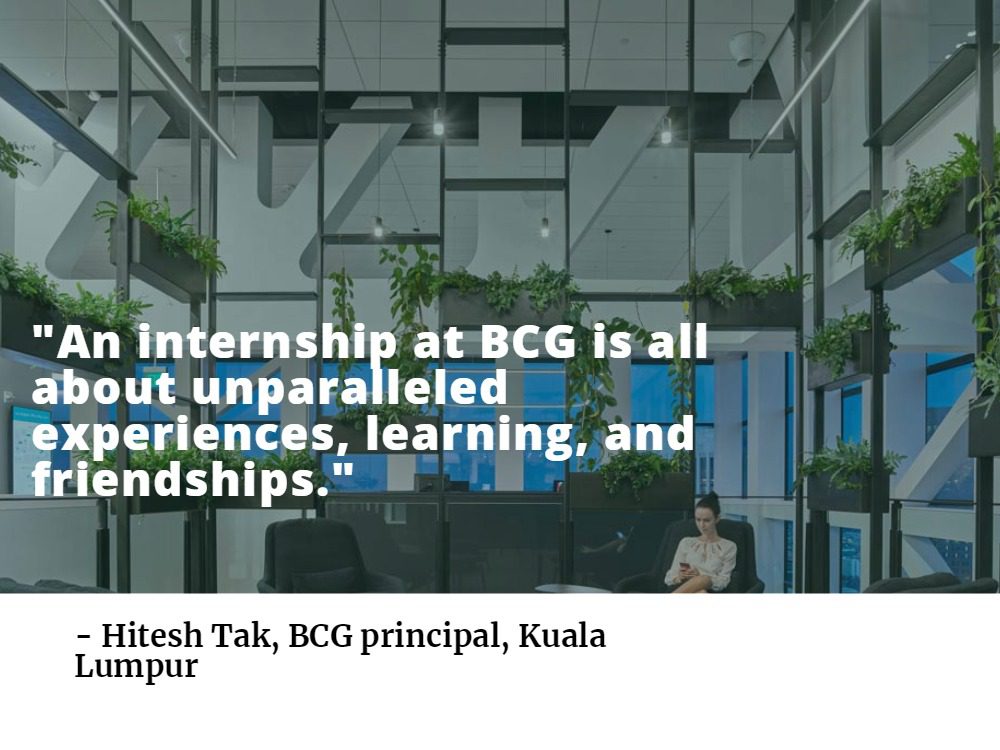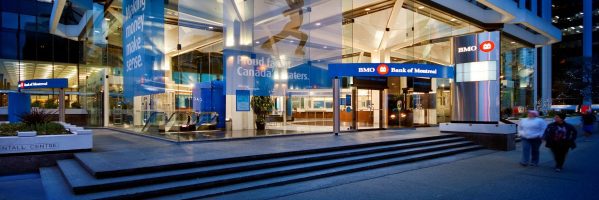How Can You Get a Job at Boston Consulting Group in 2018?

Boston Consulting Company—a global management consulting firm— has offices across more than 90 cities and 50 countries, advising clients in the private, public, and not-for-profit sectors, including a healthy chunk of Fortune 500 companies. Considered one of the most prestigious management consulting firms in the world, BCG was ranked fourth in Fortune’s “100 Best Companies to Work For” in 2018.
But, how can an MBA help you land a BCG job?
Working for BCG
According to Management Consulted, BCG has a demanding recruiting and hiring system. The firm hires undergrads as associates who work for two to three years before moving on or pursuing an MBA. However, it is very difficult and highly unlikely for an associate to make the leap to consultant without an MBA. If you’re hired as an MBA, you enter as a consultant with plenty of room for growth—to project team leader, principal, and then, finally, as a partner partner.
According to former BCG senior partner Lucy Brady, the company looks for a candidate’s record of academic and professional success, but also want to hire candidates who have overcome setbacks.
“We look for resiliency and adaptability, and the ability to learn from your mistakes and grow from them,” she said in a previous interview.
CNN revealed that 11.72 percent of MBAs want to work for BCG. However, BCG’s recruiting process is demanding, with Glassdoor previously ranking the firm among the most difficult companies to interview with.
The high job demand and lengthy interview process isn’t without reason: MBAs typically thrive at BCG due to the companies the emphasis on career development. BCG’s PTO (predictability, teaming, and open communication) policies allow for a healthy work-life balance for employees, which has paid numerous dividends. Internal surveys have shown that the program has led to a 74 percent increase in reported intentions to stay with the company for the long term. BCG was also among the companies that signed the 2016 White House Equal Pay Pledge.
BCG Recruiting on Campus
BCG actively recruits students on college and university campuses around the world. Campus visits are a way for students to connect with BCG, learn more about potential job opportunities, and feel out whether a career at BCG is a good fit.
“We have a presence at many of the top universities across the U.S., including Harvard, Stanford, the University of Pennsylvania, Northwestern, University of Michigan, Duke, and the University of Texas,” Tina Gao, BCG recruiting director, said in a previous interview. “We come to campus and hold a presentation to introduce the company and then are available for Q&A sessions. We also come back to help people train for our interviews and learn more about the company. We’ll come back to campus to interview the candidates we choose.”
You can see more upcoming BCG on campus events here. However, if your campus does not have a dedicated page, BCG encourage students to complete an online application for consulting internships.
BCG Internships
BCG’s consulting internship programs can be a great opportunity for students to get a feel for the the life of a consultant. BCG Associate and Consultant interns work with current BCG consultants, and are expected to contribute to a real client project. Interns are considered as true case team members and are tasked with everything from working on client projects to socializing with colleagues.

According to BCG, internships vary depending on the project or location. Some interns are expected to travel, but do return to their home offices at the end of each week for special events and social activities. Orientation and training sessions ease interns int their roles before being assigned to a case that aligns with their personal and professional goals, as well as the firm’s business needs.
BCG accepts online applications from exceptional business school, engineering, science, law, and humanities students who are nearing the completion of their undergraduate or graduate studies.
BCG MBA Fellows
If you’re an MBA who wants to get your foot in the door at BCG, it’s worth looking into the BCG Fellows MBA Program, which provides top applicants with monetary awards and individual mentorship by BCG consultants.
The fellow program is only available to full-time MBAs studying at the following business programs: Columbia Business School, Fuqua School of Business, Kellogg School of Management, Harvard Business School, MIT Sloan School of Management, Stanford Graduate School of Business, Stern School of Business, Tuck School of Business, Anderson School of Management, Booth School of Business, Ross School of Business, Darden School of Business, The Wharton School and Yale School of Management.
BCG MBA Salaries
If you score a job at BCG, you’ll also be earning a big paycheck—well worth the hours of MBA studies and the rigorous recruiting process. According to Management Consulted, MBAs hired a BCG make earn the following within their first year of employment:
- Signing Bonus: Up to $30,000
- Base: $147,000
- Relocation: $2,000-8,000
- Performance Bonus: up to $44,100
- Retirement: Profit-sharing into a 401k
What is the Most Valuable San Francisco MBA?

There’s no doubt: San Francisco is a great city to earn your MBA. Located near Silicon Valley, business schools throughout the area provide not only an excellent education but also opportunities to interact with many tech and industry leaders in the area. But which MBA programs in San Francisco are the best?
This is not an easy question to answer. You can check rankings, to see which MBA programs perform well based on surveys and statistics provide to The Financial Times, U.S. News and World Report, and The Economist. And that’s a great place to start, but probably the most essential value when determining the right MBA program for you is your return on investment (ROI).
The ROI of an MBA program is one of the best indicators of what your MBA is actually worth. It looks at statistics such as average salary increase, post-graduation employment, tuition cost, cost of living, and more. To help you out, we looked in-depth at the best business schools in San Francisco to see which offer the best ROI. Continue reading…
California Job Growth, and More – Los Angeles News

We’ve rounded up some of the biggest news coming out of Los Angeles business schools this week.
California Gains 35,500 jobs, and Unemployment Falls to Record-Low 4.4% – Los Angeles Times
In a recent interview with the Los Angeles Times, Pepperdine University Graziadio School of Business and Management economist Dave Smith spoke about California’s remarkably positive streak of job growth, saying, “I don’t see how we can avoid decent wage growth, which is a positive thing for workers.”

“In Los Angeles County in January, employers added 7,200 jobs. In Orange County, payrolls rose by 4,300; in the Inland Empire they increased 2,000.” – Andrew Khouri, Los Angeles Times
You can read more about the story from the Los Angeles Times here.
Graduate Career Mentor Programs for Spring 2018 – CSULB Newsroom
The Graduate Career Mentor program for spring 2018 at the California State University, Long Beach College of Business and Administration kicked off on February 12th, continuing its work of connecting industry professionals with current CSULB graduate students. Currently, 20 graduate students in both the MS Supply Chain Management and Accelerated MBA program have mentors.
The program, which is overseen by assistant director of graduate business career services Michelle Levy, aims to pair current students with professionals to develop a strong mentor-mentee relationships. Not only will the mentor help students navigate through their business degree, but will also vastly expand their professional network, offering professional advice and helping discover new opportunities.
Click here for more information on the Graduate Career Mentor Program at CSULB, or to learn how to become a mentor yourself.
YouTube Will Add Information from Wikipedia to Videos About Conspiracies – The Verge
YouTube CEO and UCLA Anderson MBA alumni Susan Wojcicki has been dealt an unfortunate hand with her company; being forced to confront the rise of conspiracy theories.
Wojcicki spoke about the way YouTube is changing its methods at South by Southwest in Austin, saying, “When there are videos that are focused around something that’s a conspiracy—and we’re using a list of well-known internet conspiracies from Wikipedia—then we will show a companion unit of information from Wikipedia showing that here is information about the event.”
Buzzfeed technology reporter Ryan Mac recently discussed the issue in more detail on his Twitter feed, noting those utilizing the site to spread conspiracies tend to craft shady or out-right false information much faster than Wikipedia can counteract it.
.@SusanWojcicki “If there is an important news event we want to be delivering the right information.”
Minutes later she says, “We are not a news organization.”
— Ryan Mac (@RMac18) March 13, 2018
Find out more about Wojcicki and YouTube’s attempts to curb toxic conspiracies here.
What MBAs Should Know About BMO Financial

BMO Financial Group, established in 1817 as Bank of Montreal, is one of the largest diversified financial service providers in North America. According to BMO, more than 45,000 employees serve the financial needs of more than 12 million customers. Continue reading…
The Future of Employment at Philly Business Schools

When considering where to get your MBA, one of the first questions you should ask is, “What will my employment outlook be?” After all, the reason you get an MBA is to improve your career. But what is important when it comes to employment trends at the leading business schools in Philadelphia? There are quite a few different statistics you should look at.
Important MBA Employment Statistics
To choose an MBA program based on your future career success, there are a few questions you need to answer.
- What industry do I want to work in and does the school place a majority of their students in that industry?
- What percentage of students receive and accept job offers? The same for internships?
- Self-employed or entrepreneurship data?
- What salary can I expect?
- Where do most students end up living and work?
- Who are the top employers?
You also want to look at any trends between years. For example, the percentage of students receiving job offers should increase year-over-year. And if you see a shift from the consulting industry to financial services, you want to be aware that the school could be changing its direction.
So, what does employment look like for three of the top Philly business schools?
The Wharton School
At the Wharton School at the University of Pennsylvania, the employment trends year-over-year are fairly consistent. While the percentage of students reporting job offers dropped from 2016 to 2017, part of that reason may be the increased number of students seeking employment (75.2 percent vs. 79.1 percent).
As for the increase in median salary, that can be attributed to inflation as well as an increase in job salary for each industry including professional services rising from $160,000 in 2016 to $180,000 in 2017. The location of jobs also changed slightly between 2016 and 2017, but that could be due to various reasons including the current state of international affairs for the U.S.
| The Wharton School | 2017 | 2016 |
|---|---|---|
| Percentage of students reporting job offers | 97.1 percent | 98.3 percent |
| Percentage of self-employed students or those starting their own business | 4.8 percent | 5.8 percent |
| Median Salary | $130,000 | $125,000 |
| Location Choices | 88.7 percent U.S. 11.3 percent International | 86.9 percent U.S. 13.1 percent International |
As for where MBA students at the Wharton School gain employment, there are a few important notes. The same top three industries—financial services, consulting, and technology—attracted students in both 2016 and 2017. However, the percentages were a little more evenly distributed in 2017. As for the companies hiring students, most of the same companies showed up each year.
| Top Three Industries | Percentage of Students (2017) | Percentage of Students (2016) | Companies Employing Two or More Students (2017) |
|---|---|---|---|
| Financial Services | 32.7 percent | 35.1 percent | Barclays, CITI, and HSBC |
| Consulting | 28.3 percent | 26.6 percent | A.T. Kearney, McKinsey & Company, and Boston Consulting Group |
| Technology | 16 percent | 12.6 percent | Adobe Systems, Amazon, and IBM |
Penn State Smeal College of Business
Pen State’s Smeal College of Business is consistent year-over-year in regards to its MBA employment trends. The percentage of student reporting and accepting job offers increased between 2016 and 2017 from 88.9 percent to 91.5 percent. However, the median salary stayed consistent at $105,000, and the hiring trend of most MBA students staying in the U.S. also remained the same.
| Penn State Smeal College of Business | 2017 | 2016 |
|---|---|---|
| Percentage of Students Reporting Job Offers | 91.5 percent | 88.9 percent |
| Median Salary | $105,000 | $105,000 |
| Location(s) | 98 percent U.S. 2 percent International | 96.5 percent U.S. 3.5 percent International |
As for where MBA students at Smeal College gain employment, there are a few important notes. While the same industries made the top four each year, where they placed changed. In 2016, the top industry was consulting (25 percent) while that changed to manufacturing in 2017 (20 percent). In 2017, retail also moved into tie consulting for the second most sought-after industry, while technology actually decreased year-over-year (23 percent vs. 15 percent).
| Top Four Industries | Percentage of Students (2017) | Percentage of Students (2016) | Companies Hiring |
|---|---|---|---|
| Consutling | 18.5 percent | 25 percent | Deloitte, EY, and PricewaterhouseCoopers |
| Technology | 15 percent | 23 percent | Amazon, Apple, and Dell |
| Manufacturing | 20 percent | 14 percent | Amphenol Corp, CHEP, International Inc. |
| Retail | 18.5 percent | 14 percent | Anheuser-Busch, Proctor & Gamble, and Johnson & Johnson |
Rutgers Business School, Camden
In 2017, the Financial Times ranked the Rutgers MBA as the best program for MBA employment across Big 10 schools. In 2016, Bloomberg Businessweek also ranked Rutgers as the best MBA program for job placement in the U.S. This indicates a relatively steady year-over-year employment trend for MBA students.
As for the median salary of a Rutgers MBA, students in 2017 could expect to earn $95,680. As for the most popular industries, they were:
- Pharmaceutical/Biotech/Healthcare: 46 percent
- Consulting: 13 percent
- Consumer Products: 13 percent
- Other: 14 percent
How Toronto Schools Can Help You Pay for Your MBA

Earning your MBA can be an expensive prospect. In Canada, tuition at the most expensive MBA programs can cost more than $100,000 for full-time and part-time students. This can be difficult for some low-income applicants.
So, what are some Toronto schools doing to help offset the cost of tuition, living, and other expenses to pay for your MBA? Continue reading…
